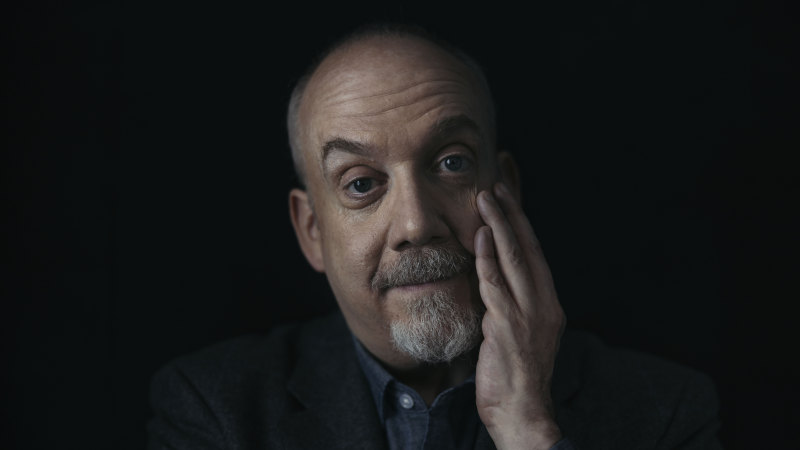
‘If I was like these guys, no one would employ me’: The Holdovers star Paul Giamatti
12/21/2023By Karl Quinn
Paul Giamatti photographed in New York on November 27, 2023.Credit: Victoria Will
Save articles for later
Add articles to your saved list and come back to them any time.
Paul Giamatti has played a vast range of characters in more than 30 years in the business, but there’s a real chance he will forever be best known for the two movies he has made with Alexander Payne, the much-loved Sideways (2004) and the new and equally praised feature The Holdovers.
In both, Giamatti is cast as a curmudgeon, to put it mildly. Is that really who the New York-based actor is?
“Some days, yes,” he says with distinctly uncurmudgeonly good grace. “Some days it definitely is. But most of the time, I would say no. I mean, if I was like these guys, I don’t know that anybody would employ me.”
Giamatti plays Paul Hunham, a teacher of classics at an upscale private boarding school in rural Massachusetts in 1970. He’s a stickler, a hard marker, a man who has dedicated his life to the calling of teaching but whose methods have won him nothing but loathing from his young charges. And given most of the boys he calls vermin will never come close to living up to his standards, the feeling is more or less mutual.
Gaimatti’s Paul Hunham is a classics teacher at an upscale school in 1970, who labels his teenage charges ‘vermin’.Credit: Seacia Pavao/Focus Features
So when Hunham is tasked with staying behind at the school over Christmas to chaperone the handful of boys not going home for the holidays, it’s a cruel and unusual punishment for all involved.
There’s a risk, I suggest, that this movie could do for teaching what his performance as Miles, the misanthropic wine writer of Sideways – for which Payne and Jim Taylor won the best adapted screenplay Oscar in 2005 – did for merlot. Which is to say, kill it.
“Apparently we did,” he says of the earlier film’s effect on the once-popular variety. “I really do not know anything about wine. I’ve never understood why it was merlot. Is that really a low-rent wine?”
It’s certainly not pinot noir, Miles’ favourite tipple, let’s put it that way. But what about teaching – do you know much about that?
“It was sort of the family business, though I didn’t go into it. Everybody in my family was teachers – my parents, my grandparents – so I was around it quite a bit.
“I drew on that, consciously and unconsciously,” he continues. “I have lots of memories of people like Hunham. My father [who was an English literature professor at Yale] had a lot of colleagues who were like that. I went to a school like that, so I had teachers who were a lot like that. I went to school about 10 years after the movie was set, so a lot of those guys were still teaching at the place I went. So it was all right there.”
The film isn’t just set in 1970. Payne has also painstakingly recreated the look, feel and pace of a movie from that time. Think of The Graduate, Carnal Knowledge, Five Easy Pieces and you’re in the ballpark. It’s a remarkable feat, and one of the reasons The Holdovers is generating plenty of awards-season buzz.
Sticking to the house style wasn’t a chore for those on set, though, Giamatti says. “I know the movies he’s talking about, but I don’t know that there was anything I was ever consciously thinking about. You just know the feel of those things, you know the mood of them, you know the style of them. And it was written that way.”
It’s almost as if Payne is a filmmaker from another time anyway. “He doesn’t use a monitor, the crew is very slimmed down, so it feels like something from another era,” Giamatti says. “And he creates what I imagine the atmosphere on, say, a Hal Ashby movie probably was like – it’s very intimate and fun, kind of warm, and laid back. So I think it just lends itself to turning out as a ’70s movie.”
In one respect, though, The Holdovers feels like a movie that could not have been made in 1970, at least not in precisely the same way.
After circumstances conspire to reduce the cohort of boys from five to just one – newcomer Dominic Sessa as Angus Tully – the ground is set for a buddy movie. But it becomes apparent the only other member of staff stuck at the school over the two weeks, cook Mary Lamb (Da’Vine Joy Randolph), is no support player, as she likely would have been back then: she’s a third and equal side of an evolving relationship triangle.
The Christmas break is key to that happening, says Randolph, best known for her turn as Detective Donna Williams in Only Murders of the Building (negotiations for a fourth season are, she reveals, well under way, and looking promising). “I think in any other circumstance that wouldn’t have happened. It’s to their advantage that by being on a holiday break it’s somewhat neutral ground.
“Normally that atmosphere is quite charged with the dynamics of social class,” she continues. “All those variables would have inhibited them if this holiday break didn’t happen, I don’t think they would be able to have this very unique experience and connection without this inconvenience, this unexpected change that they don’t want to do, but which ends up being the absolute blessing they all need.”
In keeping with the commitment to lo-fi 1970s-style filmmaking, the movie was shot on location at five different schools in Massachusetts (subbing for the fictional Barton School), in winter, with real snow. And the cigarettes Mary smokes endlessly throughout were real too – which was a challenge for non-smoker Randolph.
“They say kids and pets will easily upstage an actor, but I quickly came to find cigarettes can do the same thing,” she says.
Payne sent her a couple of boxes of prop cigarettes, but they just didn’t look or feel right. So she sought out the lightest brand she could find and practised. “Bette Davis was a great reference because there’s quite a style to smoking,” she says. “And an avid smoker in a quite heightened emotional state is a whole other thing.”
The burning durry was more than a prop for Mary, it was a comfort blanket, and a key to her character and state of mind. “It was great fun trying to decipher when to pull, when to release, the choreography of smoking while another person’s talking,” she says. “I’m not trying to condone smoking in any way, but it made me realise as a non-smoker entering into this world it really comes down to meditative breathing, long, deep inhalations. If I’m frazzled, or a little off-centre, or I feel worried or anxiety or in an emotional state that I don’t necessarily want to be in – I mean, it would help if they just removed the nicotine – but at the end of the day, they are taking these regulated, meditative breaths.”
Alexander Payne, left, directs Giamatti and Da’Vine Joy Randolph on the set of The Holdovers.Credit: Seacia Pavao
And once you’d finished it, did you kick the habit?
“Oh, immediately,” she says. “I was actually very nervous that I was going to get addicted. But thank goodness, it wasn’t for me. It’s not my thing.”
For Giamatti, the key to Hunham was more intellectual than physical.
“I mean, he’s a difficult guy but I like him,” he says. “He kind of takes pleasure in being sarcastic, in his own wit, he’s complicated, but I thought he was funny, I thought he was smart, I like where he goes. I like the fact that he’s able to be selfless in the end. You know, he had a lot of layers to him, and I liked that.”
The Holdovers is overtly about class and privilege. It’s an uncommon subject for American cinema to address, but Giamatti thinks a lot of Payne’s movies – which also include Election, Nebraska and Downsizing – are about the subject.
“I think Sideways, in some funny ways, was about class too,” he says.
But Payne is no Ken Loach. He addresses the subject with more wry humour than anger, and for Giamatti that’s what makes working with him such a delight.
“I like the kind of melancholy funny thing that he does,” he says. “It’s funny, kind of, and it sort of isn’t funny, too.”
The Holdovers is in cinemas from January 11.
Contact the author at [email protected], follow him on Facebook at karlquinnjournalist and on Twitter @karlkwin, and read more of his work here.
Find out the next TV, streaming series and movies to add to your must-sees. Get The Watchlist delivered every Thursday.
Most Viewed in Culture
Source: Read Full Article




